Staggs Plumbing is a Plumber in Dallas that Fixes Slab Leaks
Slab Leak Repair in Dallas
Wet or warm spots on your floor, water heater always running, constant sound of running water? These are common indicators of a slab leak which will damage your home if not fixed immediately.
If you have a leak coming from a water line inside or under your house’s foundation, water can rise up into your home and get everywhere. Flooring, walls, furniture and the structure of your home can be damaged because of water leaks.
Staggs Plumbing has been repairing slab leaks in homes for over 30 years.
Your Dallas neighbors trust our experienced team of slab leak experts to get the job done right the first time.
- Licensed: our plumbers are licensed by the Texas State Board of Plumbing Examiners.
- Code Compliant: our team adheres to the Texas plumbing code as well as the International Plumbing Code when repairing slab leaks.
- We use IPC approved plumbing materials.
- We follow IPC approved repair methods.
- Permits are obtained from the City of Dallas Building Inspection division.
- Accurate detection: we quickly locate the source of the slab leak using state-of-the-art equipment.
- Permanent repair: our repair process includes pipe rerouting and spot repairs.
- The City of Dallas Inspection Services team will ensure the repair was done properly and up to code.
- Insurance support: we work with your insurance company to speed up the claim process.
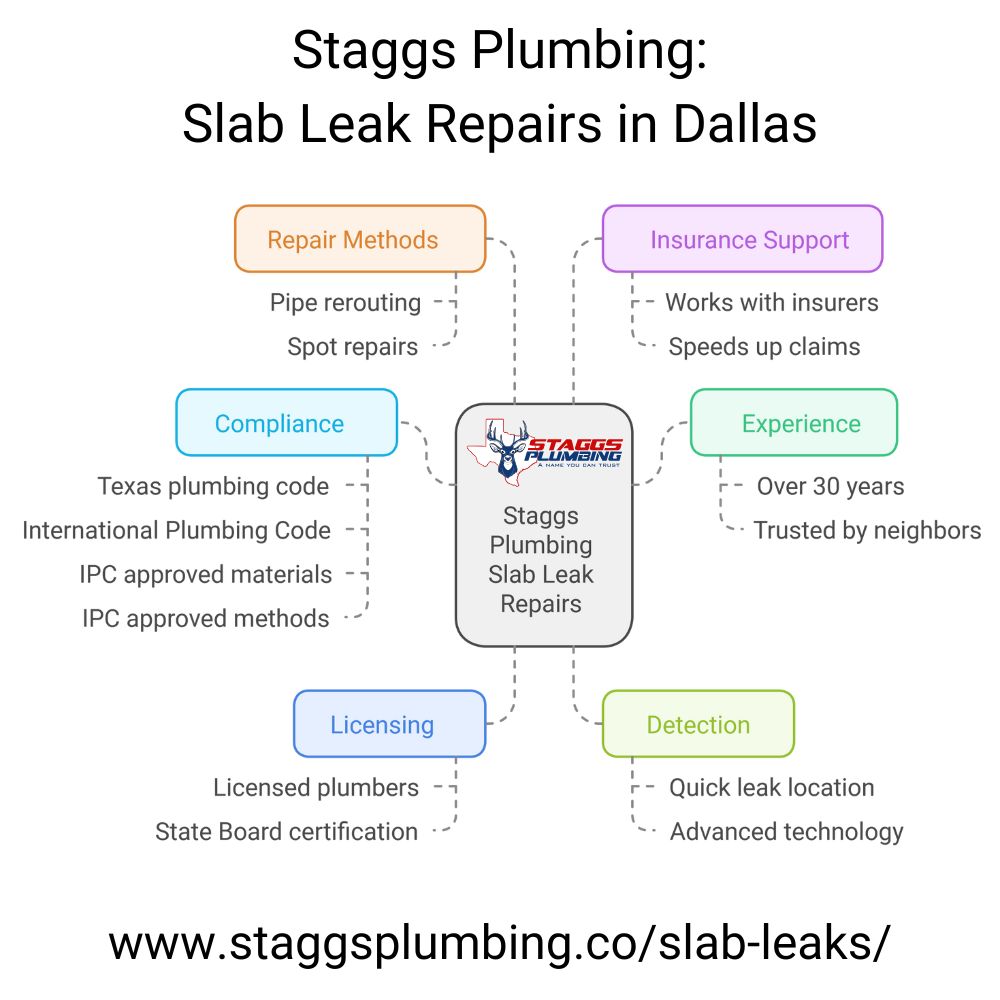
Does my Home Have a Slab Leak?
You may have a slab leak if you notice one or more of the following signs:
- Warm spots on the floor if there is a leak in the hot water supply line.
- Damp areas on carpet / flooring.
- A moldy smell in a damp area that has gone unnoticed.
- The sound of water running through pipes when all faucets and toilets should be off.
- An increase in your water bill may be an indication, but make sure you account for any other factors like sprinkler usage.
- Cracks in the wall or flooring. This is common in many houses due to the foundation settling and may not be as a result of a slab leak.
- The water meter spinning around when water shouldn’t be running.
If you see the water meter moving, it does not necessarily mean there is a slab leak. It may be also be caused by a running toilet, a dripping faucet, a dishwasher leak or a leak in a pipe in the walls or attic. To be on the safe side, call Staggs Plumbing and we’ll come out and make an accurate diagnosis.
On most water meters, there is usually a leak indicator triangle or some other device that can detect very small leaks, like a leaky faucet or a leak in other places such as a pipe underneath your home’s slab.
In this image, the leak indicator is a red triangle. Even with a small drip from a faucet, you should be able to see a slight movement in this indicator.
If you do see this indicator moving, check all of the faucets inside and outside your home for any drips, as well as toilets that may be leaking water into the bowl. If you are unable to locate the source of the water leak, call Staggs Plumbing.
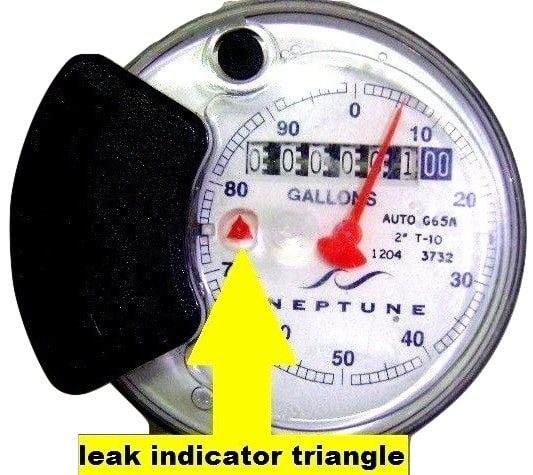
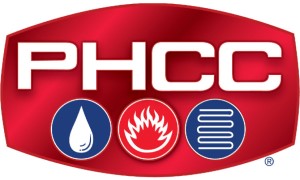
What is a Slab Leak?
A slab leak is a plumbing issue where a water pipe beneath a building’s concrete foundation develops a leak.
Homes in Dallas are often built on top of a concrete foundation. This structural base is also known as a slab. Causes of leaks in the water supply lines can happen due to factors like:
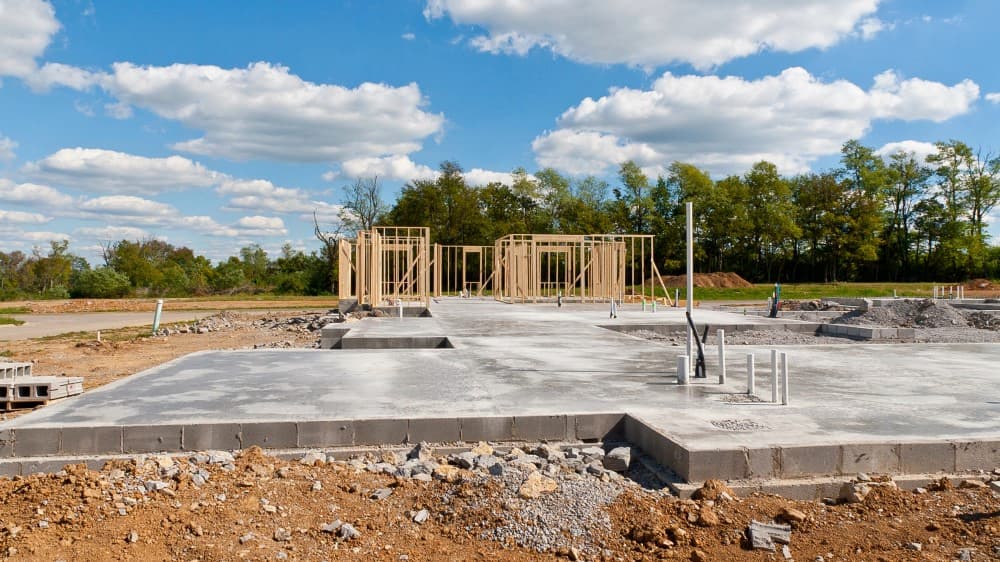
- Corrosion of metal pipes.
- Pipe damage during installation.
- Ground movement and settling.
- Construction materials that don’t meet building codes or standards.
- Defective water or sewer line installation.
- Tree roots growing under the slab.
- Excessive water pressure above 80 psi which can stress pipes.
- Water hammer surges creating pressure shock waves that stress pipes.
“Andrew & his partner were very polite, knowledgeable, thorough & answered all of my questions. Not to mention, same day service! No doubt, they have the customer’s best interest at heart. I will definitely use them again.”
“What started as a small leak turned into a huge job and Staggs did awesome. They did a great job of showing not just telling me what was wrong and why it should be replaced. We had a mix of cast iron, clay, and pvc pipes. They replaced all the plumbing and draining in our house and it is nice to know that it was done right.”
“Tony was great! He showed up right on time and was super fast. When he was finished, he was very patient and explained everything to me and the charge was reasonable. Very impressed with how organized Staggs was in setting up and running my appointment”
“We’ve used Staggs several times and I’m happy with their work. #1, they’re professionals and do high quality work. #2, they don’t invent things to charge you for. For sure you’re going to pay if a repair needs doing, but only if a repair needs doing.”
How a Slab Leak Affects Homes in Dallas
When water leaks from a pipe under the house foundation, the soil under your home gets wet. Water can also seep through the porous concrete foundation and into your home. If the water leak isn’t fixed quickly, it can cause many problems, including:
Flooring damage: Carpet and hardwood floors get soaked, and will usually need to be replaced.
Wall damage: sheet rock, baseboards and wall studs can be compromised and will need to be thoroughly dried and replaced if damage is major.
Mold: When materials like carpet, wood and sheet rock get damp, mold can grow and be a hazard to people and pets living in the home.
Foundation cracks: North Texas soil contains a lot of clay. When clay gets wet:
- Soil expands.
- Uneven pressure from the soil pushes up on the concrete slab.
- Parts of the slab are put under stress and can develop cracks.
- The structure of your home such as load bearing walls may get compromised.
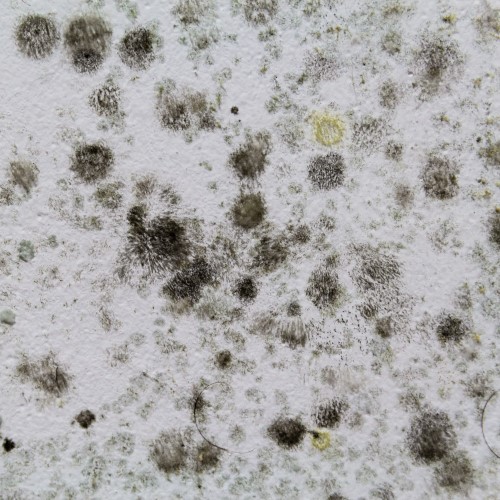
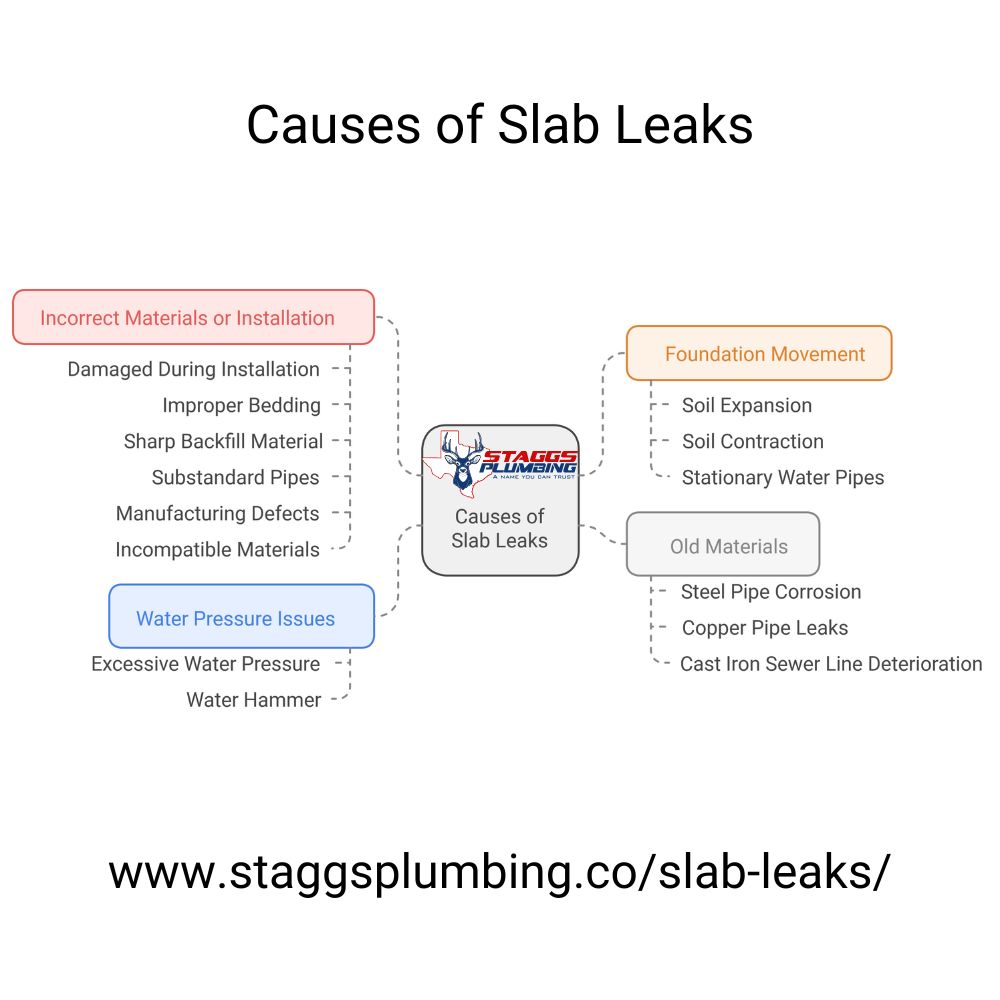
What Causes Slab Leaks?
Slab leaks are caused by foundation movement, aging plumbing materials, improper installation, and water pressure issues that damage pipes under slabs.
At Staggs Plumbing, we have been fixing slab leaks in Dallas for over 30 years, and have seen multiple reasons for this problem.
Foundation Movement
Soil expansion and contraction due to hot and cold weather causes foundation movement that stresses stationary water pipes under slabs, leading to pipe breaks.
In Dallas, we experience extremes in weather. Hot dry summers and cold wet months.
- When the soil dries out, it shrinks a little bit. This is due to the high clay content in our soil.
- When the soil contains more water, it expands a little bit. This is due to the high clay content in our soil.
Foundation movement between dry and wet seasons is normal, and happens every year.
However, while the slab goes through the stresses of being moved up and down, the water pipes going through and under the foundation remain stationary. This leads to friction and pressure on the water lines. Over time, the stress on the pipes creates a break in the pipe.
If the water lines are placed too close to the bottom of the slab, as the slab moves, the rough parts of the concrete foundation can press into the water pipe and puncture the line.
Old Materials
One of the primary causes of slab leaks is the deterioration of old plumbing materials. As these pipe materials age, they can get damaged and lead to leaks beneath the concrete slab foundation.
Homes constructed before the 1960s often used galvanized steel pipes for water lines. Over time, the zinc coating that protects these pipes can wear away, exposing the underlying steel to rust and corrosion.
Copper pipes are more durable than galvanized steel, but they can develop tiny pinhole leaks due to corrosion.
Copper pipes in contact with other metals or electrical currents can experience accelerated corrosion through a process called electrolysis.
Cast iron sewer pipes can corrode from the inside due to constant exposure to wastewater, leading to cracks and leaks under the slab.
Soil moisture and chemicals can corrode the exterior of cast iron pipes.
Wrong Materials or Improper Installation Methods
Non-compliant materials or unapproved installation techniques can damage pipes, causing slab leaks.
- Damaged During Installation: Pipes that are bent, kinked, or nicked become weak points.
- Improper Bedding: Lack of proper sand or soft soil bedding can create pressure points.
- Sharp Backfill Material. Rocks and Debris: Sharp objects can puncture or abrade pipes.
- Substandard Pipes: Using low-quality materials increases the likelihood of failure.
- Manufacturing Defects: Flaws from production can compromise pipe integrity.
- Incompatible Materials: Using pipes not suited for local soil or water conditions.
- Non-compliant Materials: Materials that don’t meet building codes or standards
Water Pressure Issues
If your plumbing system has water pressure issues, it can stress water lines, potentially leading to leaks.
Water hammer pressure surges which are sudden stops in water flow create shock waves. Consider installing water hammer arrestors to absorb water shock waves.
Excessive water pressure above 80 psi. Consider installing a pressure-reducing valve to maintain safe water pressure.
How Much Does a Slab Leak Repair Cost in Dallas?
The average price for a slab leak repair in Dallas can vary significantly based on several factors:
| Locating the leak | Before repairs can begin, the leak must be located. |
| Accessing the leaking pipe(s) | Leaks that are difficult to access or more severe in nature can drive up costs considerably. |
| Repair method used | – Spot repairs. – Tunneling. – Pipe rerouting – Trenchless pipe replacement. |
Does Insurance Cover Slab Leak Cost?
Most homeowners insurance policies cover slab leak repair in Dallas if water damage affects floors or walls. Review your policy for specific coverage details. Typically you’ll pay the policy’s deductible plus the cost of labor and materials to repair the leaking pipe. Check your insurance policy carefully, as coverage can vary a lot.
Other Costs
There may be other costs to fix damage caused by water leaking into your house. These may be covered by your homeowner’s insurance:
- Flooring replacement. Carpets and wood floors may get damaged from the water.
- Wet sheetrock replacement & painting.
- Mold remediation.
Slab Leak Repair Methods – Which One is Best?
Here are the slab leak repair methods we use, along with their pros, cons, and ideal situations for use.
Direct Access Repair
Direct access repair involves locating the exact point of the leak, jack hammering through the concrete slab from inside your home, and repairing or replacing the damaged section of the pipe.
| Pros | Cons |
|---|---|
| Cost-Effective for Single Leaks: It’s often the least expensive option when dealing with a single, isolated leak. Quick Solution: Repairs are focused on the specific problem area, allowing for faster completion. Minimal Pipe Replacement: Only the damaged section of the pipe is addressed, leaving the rest of the plumbing intact. | Invasive Procedure: Requires jackhammering the slab, which can be disruptive and messy. Potential for Flooring Damage: Tiles, hardwood, or carpet may need to be removed and replaced. Not Ideal for Multiple Leaks: If the plumbing system is deteriorating, multiple spot repairs can become impractical and costly. |
When to use spot repairs:
- Single, isolated leak: Best for newer homes or systems where the leak is a singular issue.
- Accessible location: When the leak is located in an area that’s easy to access without significant demolition.
- Budget constraints: Homeowners looking for the most affordable immediate fix.
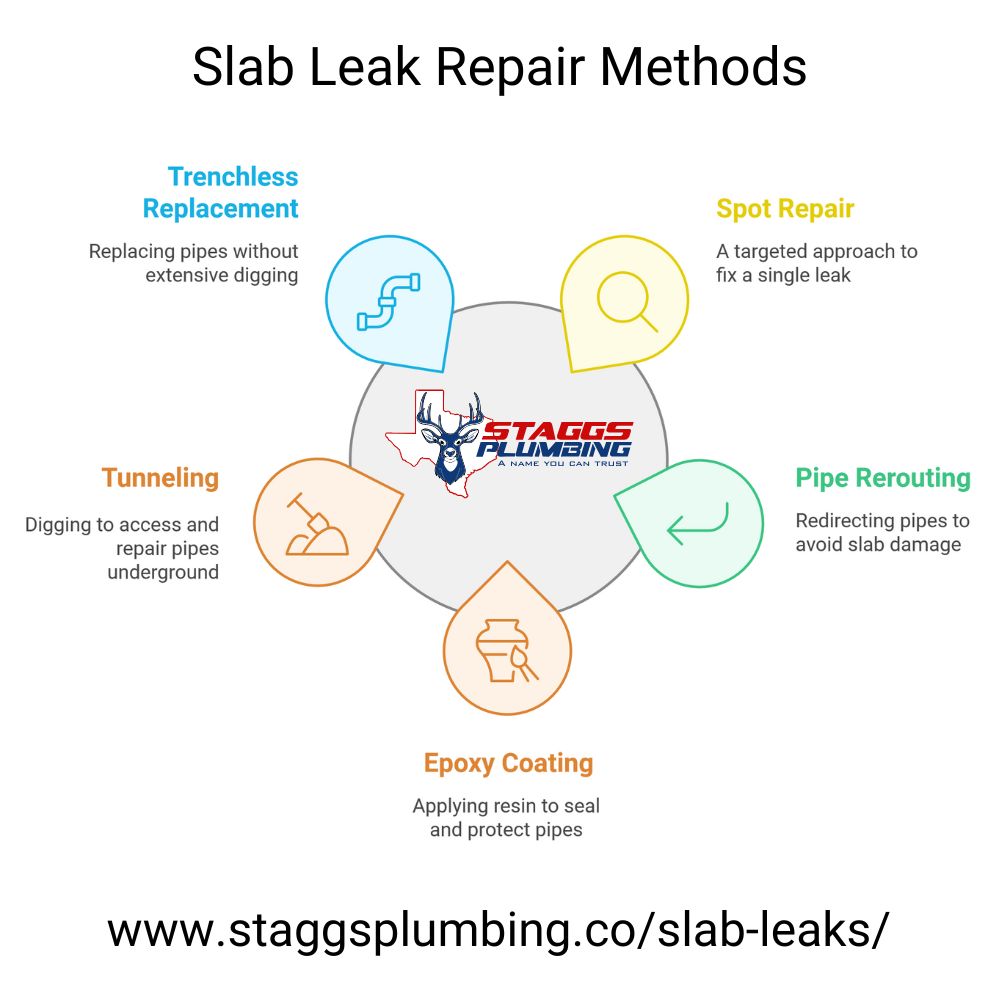
Pipe Rerouting
Pipe rerouting involves leaving the leaking pipe under the slab and installing new pipes that bypass the slab entirely. The new pipes are usually run through walls, attics, or ceilings.
| Pros | Cons |
|---|---|
| Avoids Slab Penetration: No need to break through the slab, preserving the foundation’s integrity. Minimizes Future Risks: New pipes are placed in accessible areas, making future repairs easier. Suitable for Multiple Leaks: Effective when there are several leaks or the potential for more due to deteriorating pipes. | Higher Initial Cost: Can be more expensive than a spot repair due to additional piping and labor. Aesthetic Impact: May require cutting into walls or ceilings, leading to the need for repairs and repainting. Potential for Longer Downtime: The rerouting process can take longer than a spot repair. |
When to use pipe rerouting:
- Multiple leaks or aging pipes: Ideal when the existing pipes are in poor condition or multiple leaks are present.
- Desire to avoid slab damage: When homeowners prefer not to disturb the slab or risk structural issues.
- Long-term solution: Suitable for those seeking to prevent future slab leaks.
Tunneling Under the Slab
Tunneling involves digging a tunnel from outside the home to reach the leaking pipe under the slab. This method allows plumbers to repair or replace the pipe without breaking through the slab from inside the house.
| Pros | Cons |
|---|---|
| Protects Interior Surfaces: No need to remove flooring or disturb the home’s interior. Allows Home Occupancy During Repair: Homeowners can often stay in their home without major inconvenience. Multiple Repairs Possible: Provides access to multiple pipe sections if needed. | Labor-Intensive and Time-Consuming: Requires significant manual labor, which can increase costs. Soil Stability Concerns: Improper backfilling can lead to future foundation issues. Higher Cost: Generally more expensive due to the complexity of the work. |
When to use tunneling:
- Expensive flooring or finishes: When interior disruption would be particularly costly or undesirable.
- Preference for non-invasive methods: Homeowners who want to avoid interior demolition.
- Multiple leaks under the slab: Suitable when access is needed to various points under the slab.
Choosing the Right Dallas Plumber
Choosing the right plumbing company to fix your slab leak is very important. You need to have the leak fixed correctly, and be a permanent repair. Check the plumbing company’s experience, read customer reviews, and make sure the plumbing company offers good warranties. A trustworthy plumbing company which focuses on quality and reliability will help protect your home from more damage and give you peace of mind.
Credentials and Certifications
Always check if the plumbing company is licensed and insured. It protects you in case something goes wrong. It also ensures that the the plumbing company meets industry standards.
- License and Certifications: Our Master and Journeyman plumbers are licensed by the Texas State Board of Plumbing Examiners[2].
- Certified Professionals: Our plumbers hold advanced certifications in plumbing and slab leak repair.
- Professional Associations: Plumbing-Heating-Cooling Contractors Association (PHCC) Certification[3].
Experience and Expertise
Homeowners need an experienced and knowledge plumber to fix a major plumbing issue like a slab leak.
- Staggs Plumbing has over 30 years of experience in complex plumbing issues and slab leak detection and repair.
- Ongoing Education: Our plumbing team is committed to staying current with industry practices.
- Proven Detection and Repair Methods: Staggs Plumbing uses of state-of-the-art techniques and equipment
- Customers often called us because they said “I need a plumber who really knows their stuff and can handle complex issues without causing more problems. Expertise matters a lot to me.”
| Credit | Provider | Completed On |
|---|---|---|
| 2024 – Regular CE Credit | APHCC[3] | 02/17/2024 |
| 2023 – Regular CE Credit | APHCC | 01/14/2023 |
| 2022 – Regular CE Credit | APHCC | 02/12/2022 |
| 2021 – Regular CE Credit | A-ACES[6] | 02/20/2021 |
| 2020 – Regular CE Credit | APHCC | 01/25/2020 |
Service Reliability and Standards
Look for plumbing companies that provide reliable, timely service using code-compliant, approved materials and methods.
- Reliability and Timeliness: On-time arrival and job completion within the promised time frame.
- We obtain a permit from the City of Dallas before any job starts.
- Code Compliance: Our team adheres to the Texas Plumbing Code as well as the International Plumbing Code when repairing slab leaks.
- Our slab leak repair work is inspected by the Dallas city inspector.
- Use of Approved Materials and Methods: Use of IPC-approved[1] materials and repair methods.
Customer Assurance
Look for a plumbing company which offers strong warranties, transparent pricing, and detailed estimates for peace of mind.
- Comprehensive Warranties: Coverage to ensure customer peace of mind.
- Transparent Pricing: Staggs Plumbing provides clear and upfront pricing with no hidden fees, along with flexible payment options to suit your budget.
- Detailed Written Estimates: We provide written estimates before work begins, ensuring transparency and helping you make informed decisions.
References
- 2021 International Plumbing Code (IPC) codes.iccsafe.org
- Texas State Board of Plumbing Examiners (TSBPE). tsbpe.texas.gov
- Plumbing-Heating-Cooling Contractors Association (PHCC) phccweb.org
- International Association of Plumbing and Mechanical Officials (IAPMO) iapmo.org
- American Society of Plumbing Engineers (ASPE) https://aspe.org
- Association for the Advancement of Codes, Education and Standards a-aces.com


